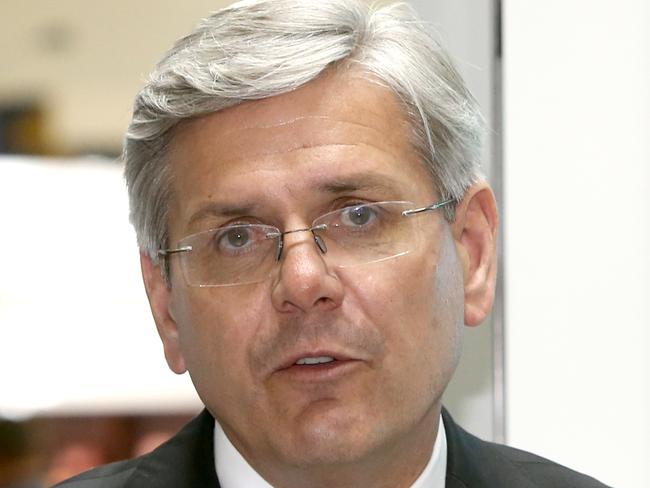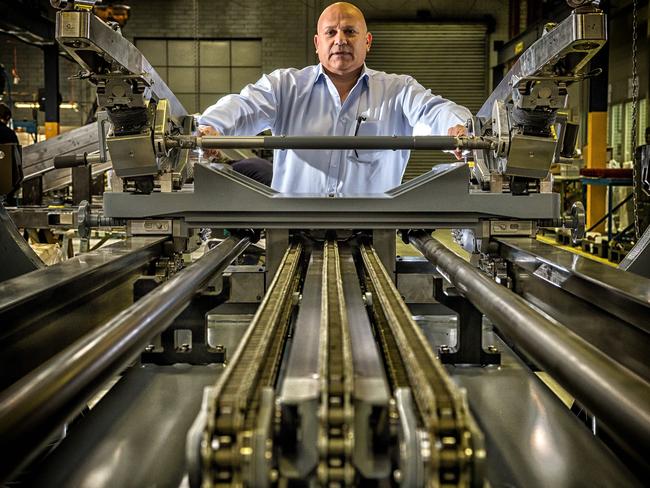Siemens boss says Australia can benefit from robotics, artificial intelligence
THE rise of automation, artificial intelligence and robotics should be viewed as an opportunity rather than a job-destroying threat, the head of Siemens Australia says.
Business
Don't miss out on the headlines from Business. Followed categories will be added to My News.
THE rise of automation, artificial intelligence and robotics should be viewed as an opportunity rather than a job-destroying threat, the head of Siemens Australia says.
Jeff Connolly, who heads the local arm of the German industrial giant, says the future of Australian manufacturing lies in designing and producing parts for global supply chains instead of trying to make complete products for a domestic market.
VICTORIA FIRST STATE TO SET UP ALL-PARTY AI GROUP
VICTORIA SET TO BENEFIT FROM F-35 JOINT STRIKE FIGHTER PROGRAM
UNIVERSITY OF MELBOURNE SIGNS DEAL WITH BAE SYSTEMS
Mr Connolly said a “fourth industrial revolution” was set to reshape manufacturing globally over the next 20 years as digital technology became fused with how goods were made.
While automation, artificial intelligence, robotics and digital fabrication technologies have sparked fears of major job losses, Mr Connolly said the changing nature of work did not equate to less of it.

“It’s definitely a big transition but many people would tell you we don’t have a shortage of jobs at the moment, we have a shortage of skills in the areas we need,” Mr Connolly told Business Daily on Tuesday.
“To survive, we really need to be globally competitive and that comes in a number of ways — how we manufacture, what we manufacture and how we see the definition of manufacturing in the future.”
Mr Connolly will tomorrow be part of a high-profile panel discussion at Broadmeadows, organised by Business Council of Australia, Sky News and News Corp, publisher of the Herald Sun. The event will allow Victorians to have their say on the best way to tackle some of the big issues facing the nation, including how to adapt to a new manufacturing environment.
Ford Australia president Graeme Whickman, DuluxGroup chief Patrick Houlihan, Business Council chief Jennifer Westacott, Kangan Institute chief Trevor Schwenke and Australia Performance Vehicles managing director Harry Hickling will take part.
Sky News political editor David Speers will moderate the forum — one of 10 such events being held nationwide as part of a campaign called Strong Australia.
Mr Connolly said Australia needed to change its mindset around manufacturing from being focused on a small domestic market to looking at where it could provide value in extensive global supply chains.
“We can still participate in the auto manufacturing industry,” Mr Connolly said. “We won’t necessarily punch out the car in Australia but we will be designing components in the virtual world that will be incorporated wherever the point of consumption is.”

Manufacturers such as Moorabbin-based Marand Precision Engineering and Western Australian shipbuilder Austal showed domestic businesses could mix on the global stage, Mr Connolly said. Marand is supplying components to the F-35 Joint Strike Fighter jet build, while Austal has won contracts from the US Navy.
Australian industry needed to make sure it was using the same design and information technology platforms as global industrial giants to participate, Mr Connolly said.
Siemens has partnered with Swinburne University of Technology and the Australian Industry Group to develop a new apprenticeship model, training students in cutting-edge manufacturing technologies.
“That transition in jobs and skills is something that is desperately needed — it’s not just about technology, it’s about a whole societal change,” Mr Connolly said.
Tickets and more details at STRONGAUSTRALIA.COM.AU



